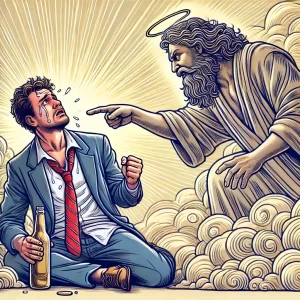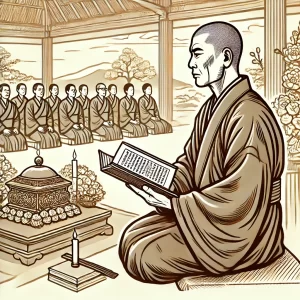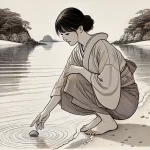帰って来たヨッパライ [Kaettekita Yopparai]
ザ・フォーク・クルセダーズ [Za Fōku Kurusedādāzu]
Words : 松山猛 [MATSUYAMA Takeshi], 北山修 [KITAYAMA Osamu]
Music : 加藤和彦 [KATŌ Kazuhiko]
The Folk Crusaders is a musical group formed by Kazuhiko Katō in Kyoto. The origin of their name comes from the American band “The Crusaders,” and their initial concept was to “introduce folk music from around the world.”
Kaettekita Yopparai was originally a track on their self-produced record, which they released while active in the underground scene. It became a massive hit after being featured on the radio in the Kansai region wiki (Kyoto, Osaka, Kobe, etc., areas with personalities often seen as the opposite of Tokyo). The single version sold 2.83 million copies, far surpassing the sales records of the time in Japan.
- 帰ってくる [kaette kuru] : return
- 酔っ払い [yopparai] : drunkard
The title “帰って来たヨッパライ / Kaettekita Yopparai” means “The Drunkard Who Came Back.”
This song uses a technique called tape speed-up. Younger people might not be familiar with this, but analog media like tape has the property of changing pitch when the playback speed is altered. The late 1960s was a period when experimental music by the Beatles influenced many musicians, and their impact can be heard throughout this song.

Incidentally, this song was also released in the U.S. under the name “Tokyo Folk Crusaders” and titled “I Only Live Twice.” Additionally, there is a film directed by Nagisa Oshima wiki, starring The Folk Crusaders, with the English title “Three Resurrected Drunkards“.
おらは死んじまっただ
ora wa shinjimatta da
おらは死んじまっただ
ora wa shinjimatta da
おらは死んじまっただ 天国に行っただ
ora wa shinjimatta da tengoku ni itta da
- おら [ora] : I
- 死ぬ(しぬ) [shinu] : die
- 天国(てんごく) [tengoku] : heaven
- 行く(いく) [iku] : go
(translation) “I died
I died
I died and went to heaven”
As explained, the tape speed-up technique makes the pitch higher, giving the song a comical sound. The guitar even sounds like a mandolin.
The protagonist’s speech in this song is in a Tōhoku wiki dialect, a regional dialect from northern Japan, which is also the setting for the previous article on “Tsugaru Kaikyō Fuyugeshiki.” However, this dialect is often used to represent a stereotypical “country bumpkin” speech and is not necessarily connected to the actual Tōhoku region. For example, the main character of Dragon Ball, Son Goku, uses “おら / ora” as his personal pronoun, which shares the same origin as the more commonly used “おれ / ore.”
長い階段を 雲の階段を
nagai kaidan o kumo no kaidan o
おらは登っただ ふらふらと
ora wa nobotta da furafura to
おらはよたよたと 登り続けただ
ora wa yotayota to nobori tsuzuketa da
やっと天国の門についただ
yatto tengoku no mon ni tsuita da
- 長い [nagai] : long
- 階段 [kaidan] : stairs
- 雲 [kumo] : cloud
- 登る(のぼる) [noboru] : climb
- ふらふら [furafura] : unsteady
- よたよた [yotayota] : staggering
- 続ける(つづける) [tsuzukeru] : continue
- やっと [yatto] : finally
- 天国(てんごく) [tengoku] : heaven
- 門(もん) [mon] : gate
- 着く(つく) [tsuku] : arrive
(translation) “Climbing the long stairs, the cloud stairs
I climbed, unsteady
I continued staggering up
Finally, I arrived at the gates of heaven”
This is a staircase to heaven, with a Christian-like imagery. But, actually, Kazuhiko Katō graduated from a Buddhist university in Kyoto. Incidentally, Led Zeppelin’s “Stairway to Heaven” was released in 1971. “

ふらふら / furafura” and “よたよた / yotayota” are onomatopoeias that describe swaying and staggering movements.
天国よいとこ一度はおいで
tengoku yoi toko ichido wa oide
- よい [yoi] : good
- ところ [toko] : place
- 一度 [ichido] : once
- おいで [oide] : “Come here.”
(translation) “Heaven is a great place, come visit once”
This catchy phrase sounds like something from a commercial, but it’s actually taken from the opening line of the famous folk song “Kusatsu-bushi,” which comes from the renowned Kusatsu Hot Springs wiki. It’s a playful nod, indeed.
酒はうまいし
sake wa umai shi
ねえちゃんはきれいだ
nēchan wa kirei da
ワーワーワッワー
wāwāwā
- 酒(さけ) [sake] : alcohol
- うまい [umai] : delicious
- 姉(あね・ねえ) [ane / nē] : older sister
- きれい [kirei] : beautiful
(translation) “The alcohol tastes good
The girls are beautiful
“酒 / sake” refers to all types of alcoholic beverages, including beer, wine, and (Japanese) sake.
“姉 / ane,” often used with honorifics as “お姉ちゃん / onēchan” or “お姉さん / onēsan,” typically refers to an older sister, but is also used when referring to young women. Similarly, “兄 / ani” (=older brother) and “お兄さん / onīsan” can be used in the same way. In this song, it’s used in a vulgar context, similar to calling a hostess.
This part sounds like a commercial for an entertainment venue.

おらが死んだのは
ora ga shinda no wa
酔っぱらい運転で
yopparai unten de
- 運転(うんてん) [unten] : driving
(translation) “I died
Because of drunk driving”
Drunk driving is absolutely dangerous! In Japan, the roads are narrow, so even a slight mistake can lead to fatal accidents.
おらは死んじまっただ
ora wa shinjimatta da
おらは死んじまっただ
ora wa shinjimatta da
おらは死んじまっただ 天国に行っただ
ora wa shinjimatta da tengoku ni itta da
(translation) “I died
I died
I died and went to heaven”
だけど天国にゃ こわい神様が
dakedo tengoku nya kowai kamisama ga
酒を取り上げて いつもどなるんだ
sake o toriagete itsumo donarunda
- だけど [dakedo] : but
- 怖い(こわい) [kowai] : scary
- 神様(かみさま) [kamisama] : god
- 取り上げる(とりあげる) [toriageru] : take away
- いつも [itsumo] : always
- 怒鳴る(どなる) [donaru] : shout
(translation) “But in heaven, there’s a scary god
He always takes away the alcohol and shouts”
「なあおまえ、天国ちゅうとこは
nā omae tengoku chū toko wa
そんなに甘いもんやおまへんのや
sonna ni amai mon ya omahen no ya
もっとまじめにやれ」
motto majime ni yare
- なあ [nā] : hey
- おまえ [omae] : you
- そんな [sonna] : such
- 甘い(あまい) [amai] : sweet, easy
- もっと [motto] : more
- 真面目(まじめ) [majime] : serious
(translation) “Hey you, heaven isn’t such an easy place
You need to be more serious”

This part is narrated entirely in a thick Kansai dialect. The scene where you think, “Is God from Kansai?” is quite funny. The person narrating as God is Kitayama Osamu, one of the members who wrote these lyrics. At the time, he was a medical student in Kyoto, and while working as a musician, he became a doctor. Now, he is a university professor emeritus and president. He’s not a god, but he became an incredibly distinguished person.
In the background, you can hear Offenbach’s Orpheus in the Underworld, known in Japan as “Tengoku to Jigoku” (=Heaven and Hell).
天国よいとこ一度はおいで
tengoku yoi toko ichido wa oide
酒はうまいし
sake wa umai shi
ねえちゃんはきれいだ
nēchan wa kirei da
ワーワーワッワー
wāwāwā
毎日酒をおらは飲みつづけ
mainichi sake o ora wa nomi tsuzuke
神様の事をおらはわすれただ
kamisama no koto o ora wa wasureta da
- 毎日 [mainichi] : every day
- 飲む(のむ) [nomu] : drink
- こと [koto] : thing
- 忘れる(わすれる) [wasureru] : forget
(translation) “Every day, I kept drinking
I forgot about the god”

「なあおまえ、まだそんな事ばかり
nā omae mada sonna koto bakari
やってんのでっかほなら出てゆけ」
yatten no dekka honara deteike
- まだ [mada] : still
- ばかり [bakari] : only
- 出ていく(でていく) [dete iku] : leave
(translation) “Hey, you’re still doing that stuff?
Then get out of here!”
そんなわけで おらは追い出され
sonna wake de ora wa oidasare
雲の階段を 降りて行っただ
kumo no kaidan o orite itta da
長い階段をおらは降りただ
nagai kaidan o ora wa orita da
ちょっとふみはずして
chotto fumihazushite
- わけ [wake] : reason
- 追い出す(おいだす) [oidasu] : drive out
- 降りる(おりる) [oriru] : descend
- ちょっと [chotto] : a little
- 踏み外す(ふみはずす) [fumihazusu] : miss a step
(translation) “So I was kicked out
I descended the cloud stairs
I went down the long stairs
I missed a step”
おらの目がさめた 畑のど真中
ora no me ga sameta hatake no domannaka
おらは生きかえっただ
ora wa ikikaetta da
おらは生きかえっただ
ora wa ikikaetta da
- 目がさめる(めがさめる) [me ga sameru] : wake up
- 畑(はたけ) [hatake] : field
- ど真ん中(どまんなか) [domannaka] : right in the middle
- 生き返る(いきかえる) [ikikaeru] : come back to life
(translation) “I woke up in the middle of a field
I came back to life
I came back to life”
The song concludes with Kitayama reciting Buddhist chants, shifting from his earlier portrayal as a god to a Buddhist monk, suggesting a funeral scene. Strangely, the second half of the song echoes the lyrics of The Beatles’ A Hard Day’s Night, and it fades out with Für Elise.

This whimsical and surreal song is filled with humor and a playful sound, perhaps embodying the lighthearted nature of Kansai people. Kato’s unique artistic touch carried over into his later work with the Sadistic Mika Band.
Incidentally, the B-side of the single is a cover of the traditional Hokkaido wiki folk song “Sōran Bushi.”
YouTube Search “Kaettekita Yopparai – The Folk Crusaders”
Thanks for reading! Feel free to comment if you have any feedback or questions.
Follow me on X.



